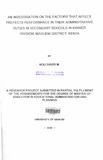| dc.description.abstract | Students are key stakeholders in educational organizations and therefore need proper and adequate representation in the institutions' management. It is with this understanding that teachers in secondary schools find it relevant to institute prefects in order to help them run the schools. The prefectorial system is one of the most effective ways of involving students directly in the administration of a school (Ozigi, 1983). In the system the prefects are delegated certain duties connected with the day-to-day life of the school, including dealing with minor cases of discipline (Ozigi, 1983). As cases of indiscipline in our schools rise, and as causes for this are sought, a need is felt to find out the factors that hinder prefects' good/performance.
This study employed the descriptive survey design to identify the factors that hinder the good performance of prefects in secondary schools in Kibwezi Division, Makueni District. The study sample comprised of twelve headteachers, 225
prefects and 518 students from twelve secondary schools in Kibwezi division. Data
was collected by use of questionnaires for students, prefects and headteachers.. Descriptive and analytical statistics were used to analyze the data obtained. Data collected from the field were coded and entered into the computer for analysis using the Statistical Package for Social Sciences (SPSS). The results of data analysis were presented in frequency tables, histograms, percentages and means while statistical analyses was carried out using the Chi-square test at the 0.05 level of significance.
The study established that prefects in most of the schools were effective in carrying out their duties, and that bright prefects performed better than less bright prefects. However, gender did not significantly (p<O.05) predict prefects' effectiveness. Majority of the students had positive attitudes of the prefectorial system, although some students reported having unfriendly relationships with prefects. The schools used various criteria for prefects' selection, including leadership . qualities, discipline, recommendation by teachers, and recommendation by other prefects. No school reported involving students in selection of prefects. The study recommends that the government provides guidelines on prefect selection and induction to school administrators and those
schools employ more participative/consultative methods in prefect selection and in
dealing with indiscipline. | en |

